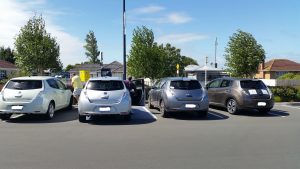Like many New Zealanders I was (till July last year) the owner of an older car (I won't say how old!) that had a lot of kilometres on the clock. When it came time to change vehicles I decided to "walk the talk" and buy an electric car. I took the plunge and bought a second hand Nissan Leaf - and it was "love at first drive". The car is very quiet, accelerates beautifully and is generally fun to drive. There's no petrol engine in the car, and it charges overnight (in about 6 hours) from a household plug (with a higher current "caravan" socket). So does "driving electric" make sense? There were about 1,250 electric vehicles registered in NZ when I bought mine - today there are more like 2,250 (see www.driveelectric.org.nz for current stats). That means more and more NZers think it does make sense.

I was pleased to see research published by EECA in New Zealand that confirmed the environmental benefits of electric cars. They state:
"Across the lifecycle, pure EVs have around 60% fewer CO2 emissions than petrol vehicles. When we just look at the CO2 emissions from use, New Zealand’s high proportion of renewable electricity generation means EVs have around 80% fewer CO2 emissions when driven in New Zealand. As the renewable proportion of New Zealand’s electricity continues to grow, the CO2 emissions from an EV will reduce further."
EECA's research also dispels concerns re net environmental impacts associated with lithium production for electric vehicle batteries.
So what's the catch? The typically advertised range of my model of Nissan Leaf, with its 24 kWh battery capacity, is 125 km on a full charge. That assumes driving on the flat on smooth roads etc. - so in reality I get less commuting range than that since we live at the top of a long winding hill. I have a fairly significant commute so I charge the car every night at home. What happened to my power bill? I opened the first one with bated breath! However the car's energy demands are relatively modest - so I traded filling up on a full tank of petrol every week, for an increase of $20 to $30 on my monthly power bill (I have a discounted rated for night rate electricity, and also have solar panels on the roof of my home that help charge the car when it's home at the weekends).
Colleagues in the Department are interested in supporting NZ's transition to more electric vehicles. We've had a student project building web-based mapping tools that assess the viability of the use of an electric vehicle in Auckland for commuting taking into account speed limits and terrain (note that driving downhill regenerates charge in the car battery). The tool is not quite ready for public use but I looked forward to seeing it deployed.
Companies such as Vector are deploying fast chargers that will charge a car like mine in 20 minutes or so. Their chargers are currently free for public use, but that will change at some point. The Government, via EECA are also trying to accelerate the transition to electric vehicles, via the Low Emission Vehicles Contestable Fund.
So, a longer post than usual, but I have a lot of love for driving electric!

